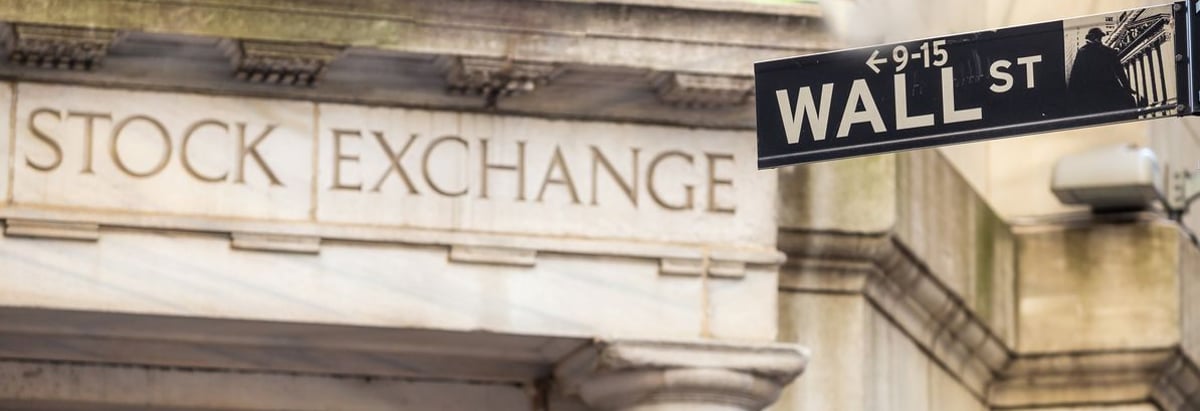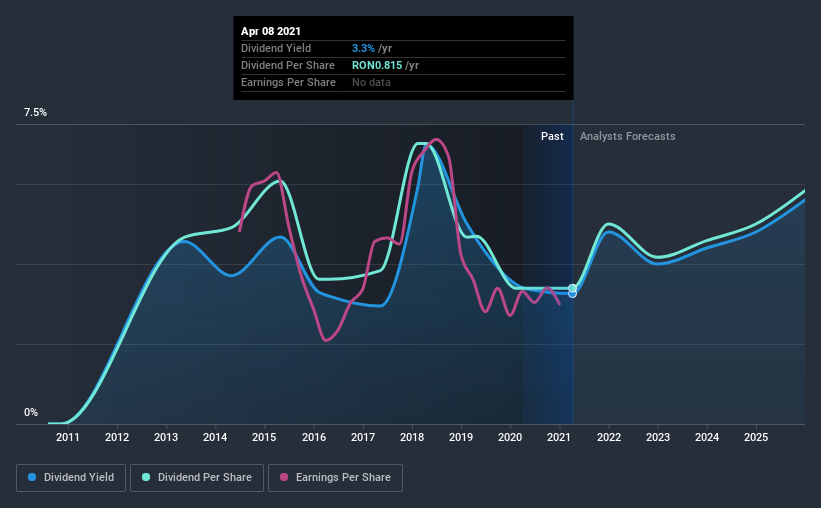- Romania
- /
- Capital Markets
- /
- BVB:BVB
Consider This Before Buying Bursa de Valori Bucuresti SA (BVB:BVB) For The 3.3% Dividend

Could Bursa de Valori Bucuresti SA (BVB:BVB) be an attractive dividend share to own for the long haul? Investors are often drawn to strong companies with the idea of reinvesting the dividends. Yet sometimes, investors buy a popular dividend stock because of its yield, and then lose money if the company's dividend doesn't live up to expectations.
In this case, Bursa de Valori Bucuresti likely looks attractive to dividend investors, given its 3.3% dividend yield and eight-year payment history. It sure looks interesting on these metrics - but there's always more to the story. During the year, the company also conducted a buyback equivalent to around 0.7% of its market capitalisation. Some simple analysis can reduce the risk of holding Bursa de Valori Bucuresti for its dividend, and we'll focus on the most important aspects below.
Explore this interactive chart for our latest analysis on Bursa de Valori Bucuresti!

Payout ratios
Dividends are usually paid out of company earnings. If a company is paying more than it earns, then the dividend might become unsustainable - hardly an ideal situation. So we need to form a view on if a company's dividend is sustainable, relative to its net profit after tax. In the last year, Bursa de Valori Bucuresti paid out 93% of its profit as dividends. This is quite a high payout ratio that suggests the dividend is not well covered by earnings.
Remember, you can always get a snapshot of Bursa de Valori Bucuresti's latest financial position, by checking our visualisation of its financial health.
Dividend Volatility
Before buying a stock for its income, we want to see if the dividends have been stable in the past, and if the company has a track record of maintaining its dividend. Looking at the last decade of data, we can see that Bursa de Valori Bucuresti paid its first dividend at least eight years ago. Although it has been paying a dividend for several years now, the dividend has been cut at least once, and we're cautious about the consistency of its dividend across a full economic cycle. During the past eight-year period, the first annual payment was RON1.1 in 2013, compared to RON0.8 last year. The dividend has shrunk at around 3.9% a year during that period. Bursa de Valori Bucuresti's dividend has been cut sharply at least once, so it hasn't fallen by 3.9% every year, but this is a decent approximation of the long term change.
A shrinking dividend over a eight-year period is not ideal, and we'd be concerned about investing in a dividend stock that lacks a solid record of growing dividends per share.
Dividend Growth Potential
Given that the dividend has been cut in the past, we need to check if earnings are growing and if that might lead to stronger dividends in the future. While there may be fluctuations in the past , Bursa de Valori Bucuresti's earnings per share have basically not grown from where they were five years ago. Over the long term, steady earnings per share is a risk as the value of the dividends can be reduced by inflation. Still, the company has struggled to grow its EPS, and currently pays out 93% of its earnings. As they say in finance, 'past performance is not indicative of future performance', but we are not confident a company with limited earnings growth and a high payout ratio will be a star dividend-payer over the next decade.
Conclusion
When we look at a dividend stock, we need to form a judgement on whether the dividend will grow, if the company is able to maintain it in a wide range of economic circumstances, and if the dividend payout is sustainable. First, it's not great to see how much of its earnings are being paid as dividends. Second, earnings have been essentially flat, and its history of dividend payments is chequered - having cut its dividend at least once in the past. To conclude, we've spotted a couple of potential concerns with Bursa de Valori Bucuresti that may make it less than ideal candidate for dividend investors.
It's important to note that companies having a consistent dividend policy will generate greater investor confidence than those having an erratic one. However, there are other things to consider for investors when analysing stock performance. Just as an example, we've come accross 2 warning signs for Bursa de Valori Bucuresti you should be aware of, and 1 of them can't be ignored.
We have also put together a list of global stocks with a market capitalisation above $1bn and yielding more 3%.
When trading Bursa de Valori Bucuresti or any other investment, use the platform considered by many to be the Professional's Gateway to the Worlds Market, Interactive Brokers. You get the lowest-cost* trading on stocks, options, futures, forex, bonds and funds worldwide from a single integrated account. Promoted
Valuation is complex, but we're here to simplify it.
Discover if Bursa de Valori Bucuresti might be undervalued or overvalued with our detailed analysis, featuring fair value estimates, potential risks, dividends, insider trades, and its financial condition.
Access Free AnalysisThis article by Simply Wall St is general in nature. It does not constitute a recommendation to buy or sell any stock, and does not take account of your objectives, or your financial situation. We aim to bring you long-term focused analysis driven by fundamental data. Note that our analysis may not factor in the latest price-sensitive company announcements or qualitative material. Simply Wall St has no position in any stocks mentioned.
*Interactive Brokers Rated Lowest Cost Broker by StockBrokers.com Annual Online Review 2020
Have feedback on this article? Concerned about the content? Get in touch with us directly. Alternatively, email editorial-team (at) simplywallst.com.
About BVB:BVB
Bursa de Valori Bucuresti
Engages in the administration and management of the financial markets in Romania.
Flawless balance sheet second-rate dividend payer.
Similar Companies
Market Insights
Community Narratives



